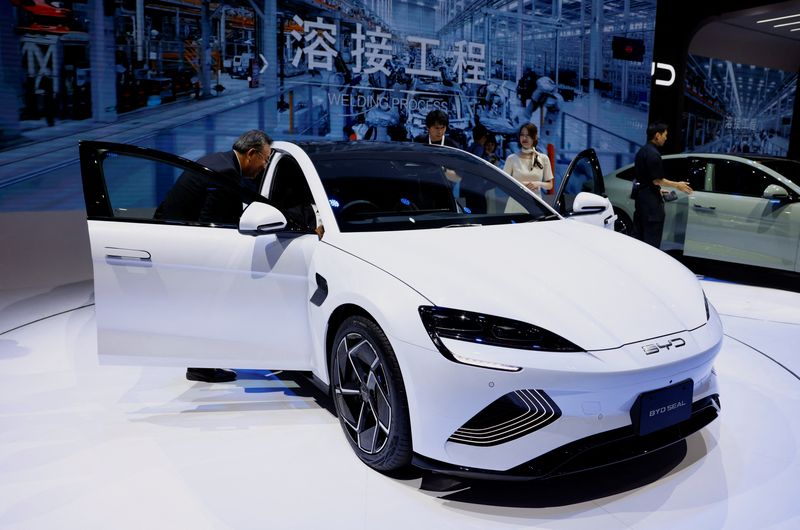BEIJING (Reuters) -China's new energy vehicle sales fell 38.8% versus the previous month, the first such drop since August 2023, industry data showed, as demand faltered in the world's largest auto market despite a renewed discounting push led by Tesla (NASDAQ:TSLA).
Vehicle sales, including those exported, totalled 2.44 million units, up 47.9% from a year earlier but down 22.7% from December, the first such slide since November, according to data from the China Association of Automobile Manufacturers (CAAM).
New energy vehicle (NEV) sales, accounting for 29.9% of total sales, grew 78.8% on year in January, the data showed.
CAAM data tracks automakers' sales to dealers and includes commercial vehicles such as trucks unless specified.
Last January, passenger vehicle sales in China plunged 37.9% on year and slumped 40.4% on month, the worst performances for January since the 2000s, according to the China Passenger Car Association (CPCA), as subsidies and tax cuts ended.
The sales then were also hit due to shortened business days as the week-long Chinese New Year fell in January last year.
China exported 443,000 vehicles in January 2024, accounting for 18.2% of the total sales, while nearly one out of seven NEVs sold during the month was also exported, CAAM data shows.
Exports have been a driving force for growth for automakers in China as demand at home weakens. But its growing clout as a vehicle exporter is causing frictions abroad.
China's commerce ministry said on Wednesday it would encourage the NEV industry to "actively" respond to foreign trade restrictions and cooperate with overseas firms, amid a European probe into Chinese subsidies for the sector.
NEV SALES
The lukewarm start to 2024 for China's auto market highlights tepid consumer demand in the world's No.2 economy amid a protracted housing downturn and a market meltdown.
In the face of slowing demand and rising competition, Tesla slashed prices on some Model 3 and Y cars in China in January and offered cash discounts for some Model Ys from Feb.1, reversing five upward adjustments since late October.
Tesla lowered the starting prices of the basic versions of Model 3 and Y by 6% and 3%, respectively, in January, versus November when it raised their prices, Reuters calculations show.
Tesla's biggest Chinese rival BYD (SZ:002594) saw NEV sales at 201,493 in January, the lowest since March 2023. Its sales were up 33.14% from the year earlier but down 40.92% from December when BYD pushed inventories to dealers at the year-end to meet its annual sales target of 3 million units.
Geely, which has brands like Zeekr, Geely and Lynk & Co, sold a total of 213,487 vehicles.
Among other EV brands, Huawei-backed Aito delivered 32,973 cars in January, up 636.83% from a year earlier and up 34.76% from the prior month, helped by sales of the new M7.
Li Auto (NASDAQ:LI)'s January deliveries fell 38.11% from December.

Total NEV sales to dealers by Volkswagen (ETR:VOWG_p)'s two joint ventures in China with SAIC and FAW nearly quadrupled in January from a year ago to 19,428 units, CPCA data shows. The industry body releases full January data on Thursday.
The steep rise was due to the popularity of Volkswagen's ID.3 hatchback. More than 10,000 units of the hatchback have been sold per month after the German automaker cut the starting price of the model to a level lower than BYD's Qin EV in July.